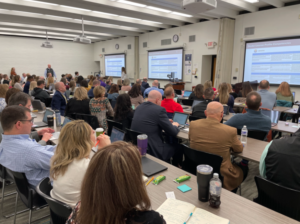Yik Yak, Geofencing and the Future of BYOD

Yik Yak, Geofencing and the Future of BYOD first ran on edCetera.com on March 21st, 2014.
By: Kirsten Winkler
The recent brouhaha around Yik Yak, an app that lets its users share secrets anonymously, made me think about the implications situations like this one might have on BYOD. But before we look into this, let me bring you up to speed with the latest trend in Silicon Valley: anonymous social apps.
What are those Anonymous Social Apps?
Secret and Whisper are currently the leaders of the pack with lots of others popping up weekly. Secret recently confirmed that it has raised $8.6 million. What is the purpose of these apps you might ask. The idea is that you can share messages anonymously with people nearby without really knowing who will receive your messages and who is going to interact with you.
Of course, the app spread like wildfire in San Francisco and soon people started sharing rumors some of which even made headlines in tech blogs and other media outlets.
It is obvious that this hype is partially driven by a tech world that is post-Snowden as well as the general human desire to share secrets without being uncovered. Unfortunately, it also is a great playground for trolls and bullies who did not waste time to join in and attack their usual victims left and right. What better than an anonymous social network now that even YouTube is forcing their users to use a real name.
Eventually, Secret had to address these issues and yes, there are of course valid points to be made for an anonymous web or at least social network when we look at recent revolutions and uprisings in which activists need to hide from the regimes. But I guess that is not so much the case for the user base those apps are currently attracting.
Yik Yak and Geofencing
As so often smart founders see a chance in taking a hype and transporting it into other verticals. This is the case with Yik Yak which is targeting college students and given that the app attracted more than 100.000 users in three months it is obvious that the idea of sharing anonymous updates is attractive to this demographic, as well.
Problems started when the app spread out of its core audience and into Middle and High Schools. As the app was linked to bullying among students but also bomb threats that put schools into lockdown, Yik Yak reacted swiftly and used so called geo fencing to prevent younger students from using the app on school grounds.
Through this feature app developers can use GPS data to enable or, as in this case, disable functionalities in applications based on the location of the device. Yik Yak worked together with data provider Maponics who has the GPS coordinates of around 85% of all schools in the US.
When a middle or high school student now tries to use the app near or inside the school, she’ll get a pop up message reading “It looks like you’re trying to use Yik Yak on a middle school or high school grounds. Yik Yak is intended for people college-aged and above. The app is disabled in this area.”
Certainly, students can still use the app outside of the geofence but as the premise is to share anonymous messages with people nearby the fun factor decreases rapidly. Of course, bullying could still take place in other places students meet, in the mall, the local fast food chain or coffee shop.
An edtech opportunity?
This is one of the rare case in which the app developer took the appropriate steps to prevent students from cyberbullying by artificially limiting the access to the product. Schools themselves currently have no possibility to control the devices and more significantly the use of those devices on school grounds.
But if we take Yik Yak as a precedent there will be voices who call for more and better control over devices that are brought into school. I think it is very likely that we will see edtech startups developing control apps that students or parents need to install on the phones or tablets before they can be brought on the school ground.
Through those apps, administrators could then regulate which apps can be used or limit the use of certain apps to times during lunch breaks or block certain apps altogether.
Kirsten Winkler started her career as an online language tutor and became one of the first successful “edupreneurs.” Through her blogs and columns on other outlets, Kirsten has established herself as one of the pre-eminent bloggers in online education.







0 Comments
Leave a Comment
Your email address will not be published. All fields are required.